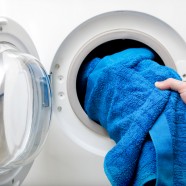
It’s the little things in life that make the most impact. The experts can do studies all day long about the average cost of using each appliance, but it’s the actual way you use it that determines how much you’re going to have to pay. Changing out light bulbs for efficient LED lights and replacing old appliances with new and greener versions is a good start toward saving energy costs, but your daily habits can undermine all that good planning if you’re used to squandering power. Take a look at the way you habitually use your appliances to see if you’re secretly wasting energy without even knowing it.
Washer and Dryer
Your washer and dryer can each cost over $100 a year to operate, so getting the most efficient use out of each one should be high on your frugal savings list. Setting up your laundry the right way and doing it all on one day is the way to start. Drying clothes one batch after another will take advantage of the residual heat, saving dryer electrical costs. Separate your clothes into lighter loads and heavier ones, and dry the lighter ones outdoors if possible. Pull the clothes from the dryer before they’re completely dry and hang them up for a wrinkle-free wardrobe. Never run a partial load, of course, and never run the dryer without first emptying the lint filter for the most efficient use.
Stove and Oven
If you’re trying to save money you’ll have to cook every day, as eating out constantly won’t be an option. Common sense use with your stove and oven can result in significant savings.
- Cook elsewhere whenever possible. Use a toaster oven for small pans of food and grill outside during warm weather to save oven energy as well as air conditioning costs
- Use the oven efficiently. Keep the door shut until at least the minimum cooking time has passed, to save money on lost heat. Turn the oven off five minutes before baked goods are done, and ten minutes in the case of meats. The residual heat will finish cooking without loss of food quality.
- Use smaller pots on smaller burners, and cover them with tight-fitting lids as often as possible. Change your pots to those with copper bottoms for the most efficient heat distribution.
- Buy or make stove reflector pans to place around burners. The shiny surface will reflect the heat and direct it upward instead of it being lost out the sides. Your grandmother and her aluminum foil around her burners was right.
Refrigerator and Freezer
Depending on its age and use, your refrigerator/freezer can be the most expensive appliance in the house. Fortunately, it’s also the one appliance that the easiest to save money with, just by changing your habits and usage.
- Start by always keeping your freezer full. The motor runs more efficiently if it doesn’t have to cool empty spaces. If you don’t have enough food to fill the space, fill milk jugs with water and use them to fill the empty spaces.
- Keep it clean to keep it efficient. Clean the rubber gaskets around the doors to remove any food or debris that can keep it from forming an airtight seal, and replace any gasket that’s cracking. Also, vacuum the fan on the back of the refrigerator once a month. Excess dust makes the motor work overtime, and clearing the area will smooth the way to saving energy costs.
- Change the refrigerator temperature to 38 degrees. You’ll still keep your food cold without allowing it to go into the food safety danger zone, but you’ll save energy by raising the temp a bit higher above freezing.
- That fridge in the man cave? If you’ve got one, replace it with a smaller apartment-sized version or, better yet, a cooler with a bag of ice. Donate the family sized version to a charity that will haul it away.
Miscellaneous
Even smaller changes can reap big savings. Did you know that the average small electric room heater costs around $300 a year to run? They among the most inefficient pieces of equipment you might have in your house. Substitute warm socks, slippers, sweaters, and electric blankets, and insulate your windows to prevent drafts in the winter so you can get rid of that energy waster.
Use kitchen and bath fans to remove moisture and smoke, but turn them off immediately after you use them.
Turn your dishwasher to economy mode to save water and electricity, or do the dishes by hand once or twice a week.

Recent Comments